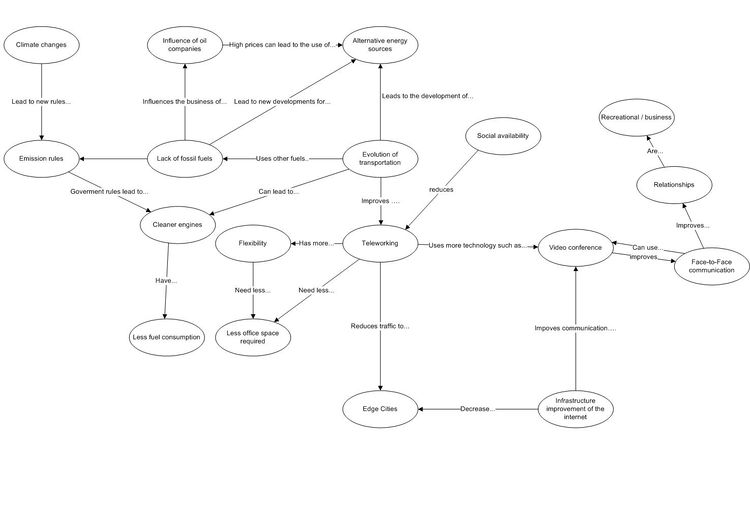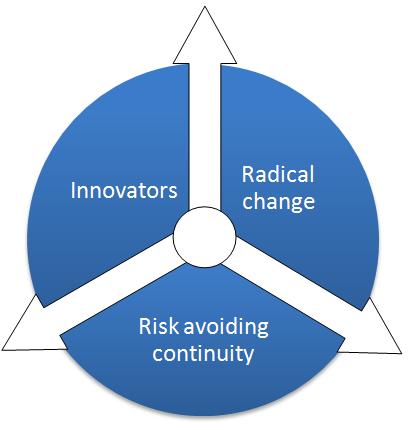Difference between revisions of "The future of mobility"
(New page: What are edge cities? An edge city is a concentration of business, shopping and entertainment outside a traditional urban area in what had been recently been a residential suburb or semi-...) |
(Undo revision 140607 by 128.192.170.31 (talk)) |
||
| (62 intermediate revisions by 9 users not shown) | |||
| Line 1: | Line 1: | ||
<h2 style="background-color: #F5F9FA; border-left:1px solid #AAAAAA;border-right:1px solid #AAAAAA; padding-left: 10px;">Team members</h2> | |||
* René de Groot | |||
* Mark Duivesteijn | |||
* Stefan Guijt | |||
* Sander van der Zon | |||
<br> | |||
<h2 style="background-color: #F5F9FA; border-left:1px solid #AAAAAA;border-right:1px solid #AAAAAA; padding-left: 10px;">Cheat Sheet:</h2> | |||
How big are edge cities? | === Edge cities === | ||
[[What are edge cities?]]<br> | |||
[[How big are edge cities?]]<br> | |||
[[How many people live in an Edge City?]]<br> | |||
[[How is the transportation to and in Edge Cities?]]<br> | |||
[[What impact have edge cities on the transportation/environment/etc?]]<br> | |||
[[Will there be more edge cities in the future?]]<br><br> | |||
=== Teleworking === | |||
[[How much and what kind of companies are using teleworking?]]<br> | |||
[[How many people are working from home or another location then the main office?]]<br> | |||
[[Are people bound to working places? (IT/hospitals/etc)]]<br> | |||
'''[[Where are they located/What size has the company/what sector are they in?]]'''<br> | |||
[[What is the impact on traffic jams?]]<br> | |||
[[What is the impact on the environment?]]<br> | |||
[[What is the impact of programs like skype and webbex on teleworking?]]<br> | |||
[[What are the cost/benefits for the employee?]]<br> | |||
[[What are the cost/benefits for the company?]]<br> | |||
[[Are companies or the government supporting this way of working? and Why/not?]]<br><br> | |||
=== Technologies === | |||
[[What future technologies are being developed?]]<br> | |||
[[What are the current technologies being used?]]<br> | |||
[[What happens if the fuel burns out? Then what?]]<br> | |||
[[Batteries? Life? Coverage? Charge time/stations? Costs? saving environment?acceptance?]]<br> | |||
[[Hybride? Life? Coverage? Charge time/stations? Costs? saving environment?acceptance?]]<br> | |||
[[What about hydrogen? Life? Coverage? Fuel stations? Costs? saving environment? acceptance?]]<br> | |||
<br> | |||
How many | === General questions === | ||
[[Who are traveling?]]<br> | |||
[[How do people travel?]]<br> | |||
[[Why do people travel?]]<br> | |||
[[Would public transportation still be available in 10 to 15 years?]]<br> | |||
[[How and how much does the government try to encourage the public transportation?]]<br> | |||
[[How and mow much do companies support public transportation?]]<br> | |||
[[How much cleaner is public transportation versus a car?]]<br> | |||
[[How many cars are there in the Netherlands?]]<br> | |||
[[How many roads are there? Length?]]<br> | |||
[[How is the mobility of the future affected by the credit crisis?]]<br> | |||
<br> | |||
<h2 style="background-color: #F5F9FA; border-left:1px solid #AAAAAA;border-right:1px solid #AAAAAA; padding-left: 10px;">Driving Forces:</h2> | |||
[[Working at home]]<br> | |||
[[Traffic jams]]<br> | |||
[[Exhausting Oil Supply]]<br> | |||
[[Traffic prices]]<br> | |||
[[Teleworking]]<br> | |||
[[Changing needs]]<br> | |||
[[Travelling salesmen problem]]<br> | |||
[[Upcoming Technological Changes]]<br> | |||
[[Upcoming Edge Cities]]<br> | |||
[[Environmental Changes]]<br> | |||
<br> | |||
<h2 style="background-color: #F5F9FA; border-left:1px solid #AAAAAA;border-right:1px solid #AAAAAA; padding-left: 10px;">Systems Diagram:</h2> | |||
[[Image:SystemDiagram.jpg|750px]] | |||
<h2 style="background-color: #F5F9FA; border-left:1px solid #AAAAAA;border-right:1px solid #AAAAAA; padding-left: 10px;">"Old Scenarios:"</h2> | |||
[[Future Transportation]]<br> | |||
[[Edge-cities]]<br> | |||
[[Grow in teleworking]]<br> | |||
[[Exhausting Fossil Fuels and New Technology]]<br> | |||
<h2 style="background-color: #F5F9FA; border-left:1px solid #AAAAAA;border-right:1px solid #AAAAAA; padding-left: 10px;">The comments made by the CIO team:</h2> | |||
There are 3 main issues why people want to be mobile: | |||
* Transport of Goods | |||
* Entertainment | |||
* Work | |||
Explore deeper into the scenarios, there is no clear solution | |||
Teleworking has also to deal with trust, employer -> employee, does the employee really the amount of work he says he does. | |||
Explore also extreme things i.e. No more cheap ryanair like flights | |||
Give scenarios in ways of the use of mobility. Set the amount of mobility for each scenario, so the key uncertainties become clear. | |||
<h2 style="background-color: #F5F9FA; border-left:1px solid #AAAAAA;border-right:1px solid #AAAAAA; padding-left: 10px;">Revised Scenarios:</h2> | |||
After discussing the comments made on our "previous" scenarios we changed our 4 scenarios into the following: | |||
[[Image:scenarios_new.jpg|frame|Figure 2: Future Scenarios]] | |||
[[Innovators]]<br> | |||
[[Radical change]]<br> | |||
[[Risk/change avoiding]]<br> | |||
Latest revision as of 15:43, 17 February 2012
Team members
- René de Groot
- Mark Duivesteijn
- Stefan Guijt
- Sander van der Zon
Cheat Sheet:
Edge cities
What are edge cities?
How big are edge cities?
How many people live in an Edge City?
How is the transportation to and in Edge Cities?
What impact have edge cities on the transportation/environment/etc?
Will there be more edge cities in the future?
Teleworking
How much and what kind of companies are using teleworking?
How many people are working from home or another location then the main office?
Are people bound to working places? (IT/hospitals/etc)
Where are they located/What size has the company/what sector are they in?
What is the impact on traffic jams?
What is the impact on the environment?
What is the impact of programs like skype and webbex on teleworking?
What are the cost/benefits for the employee?
What are the cost/benefits for the company?
Are companies or the government supporting this way of working? and Why/not?
Technologies
What future technologies are being developed?
What are the current technologies being used?
What happens if the fuel burns out? Then what?
Batteries? Life? Coverage? Charge time/stations? Costs? saving environment?acceptance?
Hybride? Life? Coverage? Charge time/stations? Costs? saving environment?acceptance?
What about hydrogen? Life? Coverage? Fuel stations? Costs? saving environment? acceptance?
General questions
Who are traveling?
How do people travel?
Why do people travel?
Would public transportation still be available in 10 to 15 years?
How and how much does the government try to encourage the public transportation?
How and mow much do companies support public transportation?
How much cleaner is public transportation versus a car?
How many cars are there in the Netherlands?
How many roads are there? Length?
How is the mobility of the future affected by the credit crisis?
Driving Forces:
Working at home
Traffic jams
Exhausting Oil Supply
Traffic prices
Teleworking
Changing needs
Travelling salesmen problem
Upcoming Technological Changes
Upcoming Edge Cities
Environmental Changes
Systems Diagram:
"Old Scenarios:"
Future Transportation
Edge-cities
Grow in teleworking
Exhausting Fossil Fuels and New Technology
The comments made by the CIO team:
There are 3 main issues why people want to be mobile:
- Transport of Goods
- Entertainment
- Work
Explore deeper into the scenarios, there is no clear solution
Teleworking has also to deal with trust, employer -> employee, does the employee really the amount of work he says he does.
Explore also extreme things i.e. No more cheap ryanair like flights
Give scenarios in ways of the use of mobility. Set the amount of mobility for each scenario, so the key uncertainties become clear.
Revised Scenarios:
After discussing the comments made on our "previous" scenarios we changed our 4 scenarios into the following:

